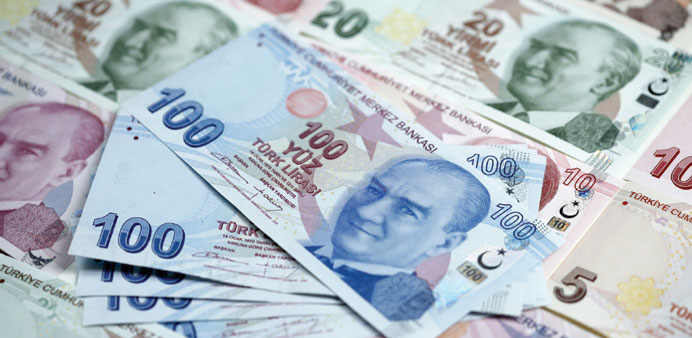The lira could test its record low versus the dollar before Turkish elections, according to ING Bank
Bloomberg/Istanbul
The prospect of a coalition government in Turkey is reviving one of the biggest bear-market trades this year.
As three separate opinion polls signalled the ruling AK Party may fail to win enough votes in next month’s parliamentary elections to rule alone, the lira extended what has been the world’s second-largest retreat among major currencies of 2015, and bond yields added to the steepest increases anywhere in emerging markets.
“There could be a lot more noise” affecting Turkish assets, Luis Costa, Citigroup Inc’s London-based chief strategist for eastern Europe, the Middle East and Africa, said by e-mail on Tuesday. “The AKP will find it very uncomfortable to govern in a coalition,” he said, recommending selling liras against dollars and euros.
Investors who a few weeks ago were fretting that President Recep Tayyip Erdogan could achieve too much power through an AK Party victory on June 7 are now concerned that securing fewer than the 276 seats needed to govern on its own will damage Turkey’s ability to bolster the economy. Growth slowed to less than 3% last year and inflation has stayed above the central bank’s target since 2011.
The lira rallied to a five-week high this month amid a global slide in the dollar.
The bullishness in the lira was overdone and even after the recent declines, investors aren’t fully pricing in the risk of an “unstable” coalition government in Turkey, Costa said. He expects the currency to depreciate to 2.87 against an equally weighted basket of euros and dollars, a drop of almost 4% from Tuesday’s level. The lira could test its record low versus the dollar before elections, according to ING Bank.
While some polls have shown the AK Party is set to gain a solid majority, over the past week, polling company Gezici Arastirma published a pre-election survey, and BusinessHT reported on polls by Sonar and Konda Arastirma that indicated an alternative outcome. All three foresee the AK Party winning no more than 41% of the vote, with the pro-Kurdish Peoples’ Democratic Party crossing the 10% threshold required to get seats in parliament. Given the way the Turkish parliamentary system works, such an outcome would leave the incumbents unable to form a single- party government for the first time since 2002. A coalition could lead to slower decision-making and swell the backlog of policy changes needed to help boost productivity and competitiveness.
“Reforms take time to materialise and need a patient strong government,” Tunc Ural, Turkey head of sales at HSBC Securities in Istanbul, said by e-mail on Tuesday. “Turkey had lots of coalition governments in the past where decision-making and implementation was slow and at times not possible. The market is worried we could see a return to those days.”
Economic growth faces threats from low domestic-saving rates, large existing debt and weaker policy support, Ahmet Akarli, an economist at Goldman Sachs Group in London, said in an e-mailed report last week. The country remains prone to “acute external imbalances” and needs strong leadership to signal a clear direction of policy, he said.
The current-account deficit surged to 8% of gross domestic product in 2013, prompting Morgan Stanley to label the country as one of the so-called Fragile Five nations most vulnerable to a tightening of US monetary policy.
The gap is set to narrow to 4.7% this year.
Growth, which averaged 5% under the AK Party’s rule, fell to almost half that rate last year and is set to increase to 3.2% in 2015. Unemployment is hovering near a six-year high.
“What’s concerning investors is the lack of growth,” Cagdas Dogan, an analyst at BGC Partners in Istanbul, said by phone on Tuesday. “And that’s where the politics really comes in. They want to make sure that whoever comes to power presses on with reforms, and fast.”
If President Erdogan, who has sought to increase his powers, uses his mandate to do so and bypasses the process of a referendum, it could raise an “existential threat to Turkish democracy,” Renaissance Capital analysts including Michael Harris wrote in an e-mailed report Tuesday.
Still, the risks associated with a coalition government are overstated and Turkey’s economy has matured enough to tolerate one, they said.
The threshold for effecting a constitutional change to enhance the powers of Erdogan, the country first directly elected head of state, is higher than the one needed to form a single-party government. If the AK Party fails to get 330 seats to push through a referendum and Erdogan still claims the powers he seeks, it could lead to tensions with the judiciary and on the streets, according to Renaissance Capital.
“In this scenario, we’d take a more cautious approach for fear of rising tail risks, and we expect corporate Turkey will do the same with its investment plans,” the analysts said.

